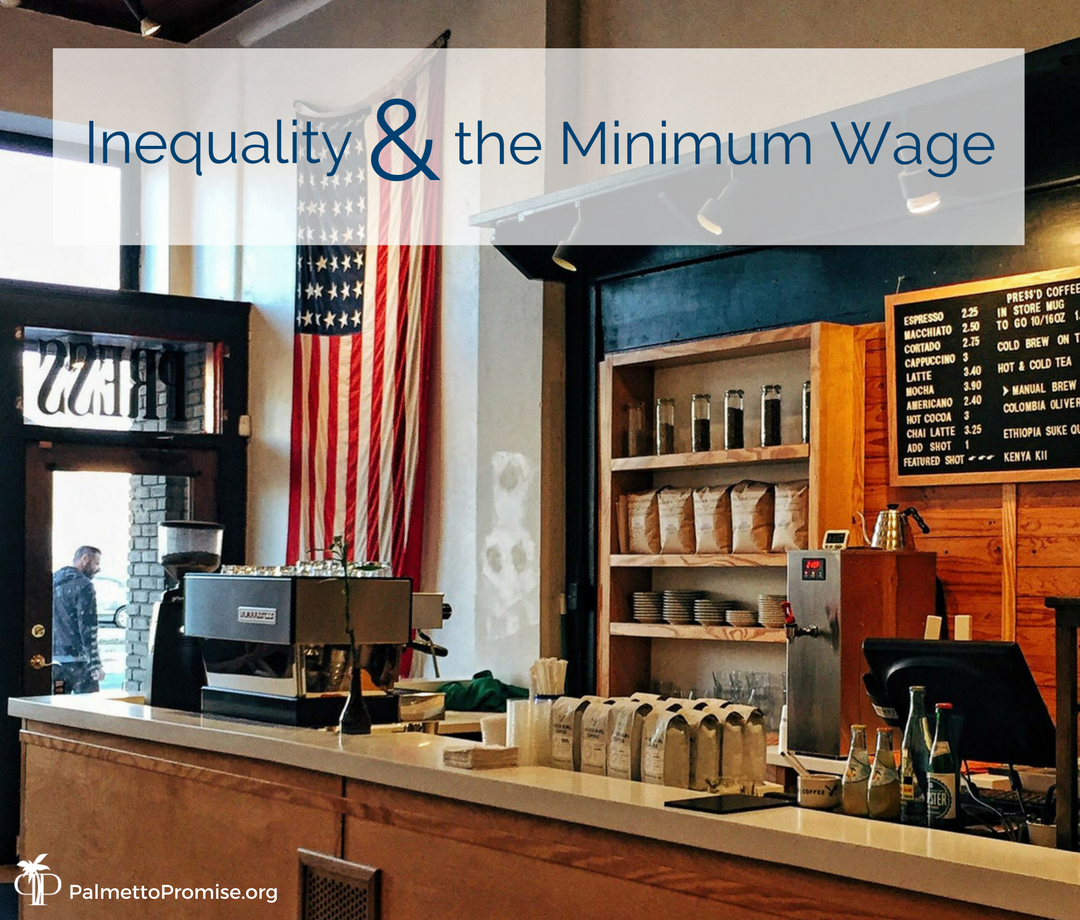Inequality & the Minimum Wage
Adriana Alvarez works at McDonalds in Cicero, IL. Ms. Alvarez doesn’t have it easy. Even though she earns $10.50 an hour—$2 more than the Illinois minimum wage—and lives a seemingly frugal life, Ms. Alvarez still has a tough time getting by. Simply put: life as a single mother can be difficult and expensive.
“I have to watch every penny that I spend — instead of Tropicana, I get the store brand, cause it’s two dollars cheaper. Since [my son] Manny is lactose intolerant, I buy him special milk formula, which is way more expensive than regular milk — $5 for half a gallon, which he’ll drink in two days. That’s a half hour work for me.”
It’s no wonder Ms. Alvarez has joined the Fight for 15 cause to raise the minimum wage to $15 for low-wage workers. Increasing her wages by nearly $5 an hour would certainly give Ms. Alvarez some much-needed breathing room.
But what happens when the McDonald’s store in Cicero is forced to raise its minimum wage to $15 an hour?
Perhaps Ms. Alvarez’s is lucky enough to get a raise and keep her hours. Her life gets easier—she can afford better food, better childcare, and maybe she can spring for that vacation she’s been dreaming about. But what about the other single-mother working at the same McDonald’s? Her hours might be cut in half. And what about the high school student who’s helping to support his family and saving for college at the same time? Unfortunately, he’s been laid-off.
Why? Because if you don’t expand the pie but give one person a bigger piece, it stands to reason that you’ll you run out of pie faster, with fewer people receiving a piece. In other words, for every one person a minimum wage increase helps, one or more coworkers feel a negative impact. But the economist Antony Davies explains this economic principle even better:
“There are always exceptions, but historically, firms have financed increases in the minimum wage by laying off minimum wage workers…Every cost must be paid by someone, and those who will pay for a minimum wage hike are the very people we are trying to help.”
Not convinced? Here’s some proof from a story we recently came across.
Starbucks, the Seattle-based coffee giant, is unexpectedly experiencing the “most extreme labor cuts in [its] history.” The major factor for these cuts? You guessed it—pressure from wage increase mandates.
The situation is so bad, in fact, that one Starbucks employee decided action was needed. Jaime Prater who has been employed at Starbucks for nearly a decade, has organized a petition, which accuses Starbucks of hurting its employees, company morale and customer service as a result of the cuts. To date, over 9,000 employees have signed the petition.
Now before we go any further, let’s address the obvious—many American workers are hurting. Jaime Prater and his 9,000 colleagues – not to mention many of our South Carolina neighbors – are feeling the squeeze of the weakest economic recovery in U.S. history. Minimum wage earners across America like Adriana Alvarez are desperate for more opportunity.
But raising the minimum wage is not the best answer to their problem. As the Starbucks examples reveals to us, raising the minimum wage does in fact help people, but only some people. Even more people, unfortunately, are ultimately hurt by this good-sounding and well-intended policy.
We don’t want to lend a hand to just a few while leaving many others behind—our aim is to help all workers flourish, which won’t be accomplished solely by raising the minimum wage.
While ultimately, the answer is a robust and growing national economy, something that has been stifled by bad policy from both Democrats and Republicans in Washington. But there are ideas that we can work on right here in South Carolina to address the problem.
First of all, we must change our mindset about minimum wage occupations. Minimum wage jobs are not intended to be a final destination, but instead, they’re supposed to be a rung on the ladder to bigger and better things. The next rungs on this ladder of opportunity – better paying, respectable jobs – are available right here in South Carolina.
But because of the “skill gap,” employers are unable to fill these positions. Talk to business owners around South Carolina and they will tell you that by and large, our education system is graduating too many workers who aren’t prepared for the jobs of today, much less tomorrow. We can help minimum wage workers by reforming K-12 education and helping them get the training they need to fill these jobs.
Some conservative policy makers have also advocated for new ways to expand the Earned Income Tax Credit (EITC). They argue that an EITC concept can give struggling families the necessary boost to live better lives, encouraging these families to find work, providing them with the motivation necessary to remain self-supporting and giving them the opportunity to improve their family’s situation.
We understand Americans earning minimum wage could use a raise, but increasing the minimum wage is an unsustainable avenue to help ALL in this situation. If we really want to help every minimum wage earner instead of just a few, we’ll reform education, expand job training and examine ideas like working tax credits to provide more effective, long-term relief.
It’s time to learn from the mistakes of Seattle and its companies. We can do better, South Carolina!




